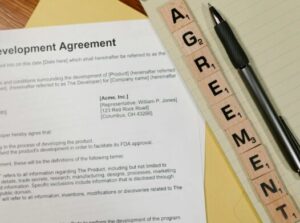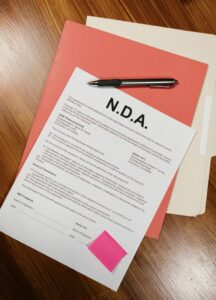Non-disclosure agreements (NDAs) are popular. Generally, non-disclosures are important in keeping information private so that it maintains its commercial or economic value. For instance, employee agreements not to disclose trade secrets or intellectual property are typical and generally enforceable NDA subject matter. On the other side of the spectrum, law enforcement complaints are not generally enforceable subject matter in an NDA. Recently, the news has been rife with a more difficult topic. In the age of the Me Too Movement, the public’s attention has focused on NDAs in settlement and employment agreements that concern the private conduct of individuals and not having much to do with maintaining a competitive advantage.
What makes an NDA enforceable?
Before discussing that more specific type of NDA, it is important to explain what makes an NDA generally enforceable. An NDA is basically a contract so there must be offer, acceptance and consideration. Offer and acceptance are easily exemplified by the handing of the NDA before a meeting involving a business opportunity or during your first day at work and your signing of it. Consideration is a more complicated concept, but it’s anything of value you would not have received but for the acceptance of the agreement. One Virginia court once explained that consideration could even be a peppercorn so long as you wouldn’t have received it but for the contract.
How the courts determine enforceability
With that said, courts have generally viewed NDAs as a restraint on trade; a lot like a non-competition or non-solicitation agreement. Therefore, a court will inquire whether the restraint is a reasonable one. The inquiry is one in which enforceability is measured by a balancing of the employer’s right to protect important and valuable information and the employee’s right to make use of their knowledge and skills.
Employers can’t hide behind an NDA when it comes to violation of law
We know that employers cannot generally hide behind an NDA when the disclosure regards reporting a violation of law to law enforcement or other government authorities. For instance, an NDA will not be generally enforceable should there be wage and hour violations that an employee wishes to report to the Department of Labor or union agreement violations to the National Labor Relations Board. A Virginia court will not modify an otherwise unenforceable restrictive covenant to make its restriction reasonable either so poor drafting is usually fatal.
Generalized NDAs will be viewed skeptically
So what about NDAs that are designed as catchall provisions, agreements that may not be designed to keep accusations of a sexual nature secret, but have that effect nevertheless? Well, there isn’t a lot of court guidance on the subject, but from what is already known about (Virginia) courts views on NDAs, employers may have an uphill battle if they wished to take the issues to trial.
First, they will be viewed skeptically since they are a restrictive covenant. A court will examine the overall reasonableness of such a term and delve into whether the agreement is necessary for the protection of the employer’s business interest and not so onerous on the employee that it would prevent him or her from exercising their own rights; for instance, and continuing with our examples, making a law enforcement complaint, making a wage and hour claim or continuing being employable.
Sexual harassment suits can be catastrophic for businesses
Second, the court may find it difficult to determine what legitimate business interest or information is being protected in a sexual harassment claim. On the other hand, a court could see sexual harassment suits as expensive and sometimes catastrophic for businesses especially in the Me Too Era. So far, contemporary cases testing the limits of NDAs in this regard have largely settled. It is those that do not that will shed light on this developing area.
Are you in need of legal advice regarding a sexual harassment claim and whether your NDA prevents you from pursuing legal action with a sexual harassment attorney? Reach out to Peter Jabaly, a seasoned lawyer who focuses on contracts, business law, and consumer protection for individuals dealing with sexual harassment, discrimination and more.
















